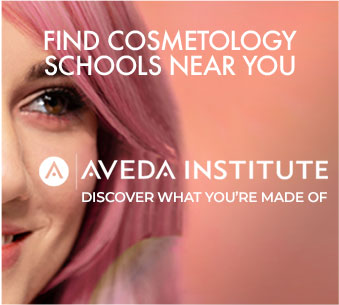Permanent Makeup Training
As a permanent makeup artist, you can earn good money by adding pigment to permanently color lips and cheeks, creating the illusion of fuller eyebrows, or even camouflaging scars from burns or surgeries. It all starts with learning the craft in beauty school and earning the license you need to start your permanent makeup artist career.
Skip to popular topics on this page: What Does a Permanent Makeup Artist Do? | How to Become a Permanent Makeup Artist | What Will I Learn in Permanent Makeup School? | What Are the Requirements for Enrolling in Permanent Makeup School? | How Long Does It Take to Complete a Permanent Makeup Program? | How Much Does Permanent Makeup School Cost? | How Do I Find the Best Permanent Makeup Program Near Me? | Can I Apprentice as a Permanent Makeup Artist? | The Final Step: Getting Your Permanent Makeup Artist License | Permanent Makeup Schools by State
Learn More About Permanent Makeup
What Does a Permanent Makeup Artist Do?
Permanent makeup artists, also known as cosmetic tattoo artists, use specialized ink and several different tools to create a long-lasting change to the appearance, complexion, and color of clients' skin. The most popular treatments involve lip pigment, eyeliner, eyeliner tattoos, and eyebrow enhancements that simulate thicker, more defined hair through modern techniques such as microblading.
While many permanent makeup artists work in spas and salons, including medspas, these aren't the only potential work environments.
As a cosmetic tattoo artist, you might also use microblading techniques to create the illusion of thicker hair on the head or face. You may work with burn victims or cancer survivors to conceal scarring after reconstructive surgery or mastectomies. You could also learn the skills necessary to hide pigment defects or create consistent color on multi-toned skin.
Like everyone in the beauty industry, you have to learn about hygiene, safety, sanitization, and cleanliness. As a professional permanent makeup artist, your success and reputation are based on client perception, professionalism, and confidence you instill in clients.
Are Permanent Makeup Artists and Tattoo Artists the Same?
The term "permanent makeup artist" refers to a professional who performs various cosmetic services, from microblading to create the illusion of thicker brows to injecting color in cheeks and lips to reducing the appearance of scars or other skin abnormalities. They use semi-permanent color—while these enhancements are meant to be long-lasting, they typically fade over time.
However, a tattoo artist is specifically trained to tattoo permanent artwork on the skin. Not only are the inks different for each artist, but so is the art they create. A permanent makeup artist works to enhance natural features, whereas a tattoo artist's designs are made to stand out.
A permanent makeup artist learns about safety and disinfection and studies subjects such as anatomy and physiology and color theory.

sponsored content, school availability varies by location

sponsored content, school availability varies by location

sponsored content, school availability varies by location

sponsored content, school availability varies by location

sponsored content, school availability varies by location

sponsored content, school availability varies by location
How to Become a Permanent Makeup Artist
The path to becoming a permanent makeup artist varies depending on location, background, and professional goals. You might…
You might have to pass exams to earn a license in some states. Other states don't require that.
What Will I Learn in Permanent Makeup School?
In permanent makeup school, you'll first learn the basics, like safety, hygiene, and client and station prep. You'll be introduced to the tools of the trade, which include coil tattoo machines, rotary pen machines, the nonmechanical hand method, and the inks, dyes, and pigments.
Regarding skills, you'll likely start by learning the most common techniques, like eyeliner, lash enhancement, and lip color. This could be followed by more advanced training in subjects such as skin needling and microblading.
Your program might also offer specialty permanent makeup classes for advanced techniques, or you could learn advanced skills session-by-session. These include high-level procedures like melanocyte restoration, burn scar camouflage, and areola re-pigmentation.
Other courses include, but are not limited to:
The Occupational Safety and Health Administration (OSHA) requires all workers exposed to blood to receive specialized safety training. This may be part of your program, or you might have to find a separate training course before you apply for your license. Cosmetic tattoo artists must learn the appropriate protocols for handling infectious materials, waste disposal, and preventing the transfer of pathogens.
What Are the Requirements for Enrolling in Permanent Makeup School?
The requirements vary by state and program, but the following are common prerequisites:
Some schools only take students who already work in a related field or hold licenses.
How Long Does It Take to Complete a Permanent Makeup Program?
Completing a permanent makeup program can take a few days to a few years. Shorter courses are often based on the assumption that students are already licensed cosmetologists, estheticians, or other trained professionals, so these classes are supplementary.
Complete programs, which allow you to start from scratch, are designed to meet state licensing requirements and last much longer. In other scenarios, you'll start with a foundational program that teaches the basics, then sign up for different training sessions based on your areas of interest.
How Much Does Permanent Makeup School Cost?
Permanent makeup programs generally cost between $3,500 and $7,500, but prices vary from school to school and by delivery method; online courses are often cheaper. Your desired subject may also determine your cost. A single multi-day training course might be around $200–$900 daily. A full program with advanced techniques and certifications could run up to $10,000.
How Do I Find the Best Permanent Makeup Program Near Me?
Start by visiting the American Academy of Micropigmentation's state search page to learn about your state's requirements. Also, visit your state's governing board, as it may maintain a listing.
Shop around and look into at least three different schools—their instructors, career services programs, and online reputation among students and industry professionals. Ensure that the schools you're considering teach the specialties that interest you. Working with burn victims, for instance, requires a different set of skills than permanent lip liner services in ways more than techniques.
Can I Apprentice as a Permanent Makeup Artist?
Some states require supervised mentorships, like apprenticeships, as part of your education and training. Others may accept only an apprenticeship. No matter what your state requires, real-world, hands-on training can be an invaluable experience.
The Final Step: Getting Your Permanent Makeup Artist License
In some states, you must be licensed as a tattoo artist before starting work. Others require you to obtain an esthetician's license and then pursue permanent makeup training in a specialty. Some states don't regulate makeup professionals at all.
The requirements for getting a license vary widely from state to state, and the American Academy of Micropigmentation is an excellent place to continue your research.
Permanent Makeup Schools Near Me
- Alabama
- Alaska
- Arizona
- Arkansas
- California
- Colorado
- Connecticut
- Delaware
- D.C.
- Florida
- Georgia
- Hawaii
- Idaho
- Illinois
- Indiana
- Iowa
- Kansas
- Kentucky
- Louisiana
- Maine
- Maryland
- Massachusetts
- Michigan
- Minnesota
- Mississippi
- Missouri
- Montana
- Nebraska
- Nevada
- New Hampshire
- New Jersey
- New Mexico
- New York
- North Carolina
- North Dakota
- Ohio
- Oklahoma
- Oregon
- Pennsylvania
- Rhode Island
- South Carolina
- South Dakota
- Tennessee
- Texas
- Utah
- Vermont
- Virginia
- Washington
- West Virginia
- Wisconsin
- Wyoming
